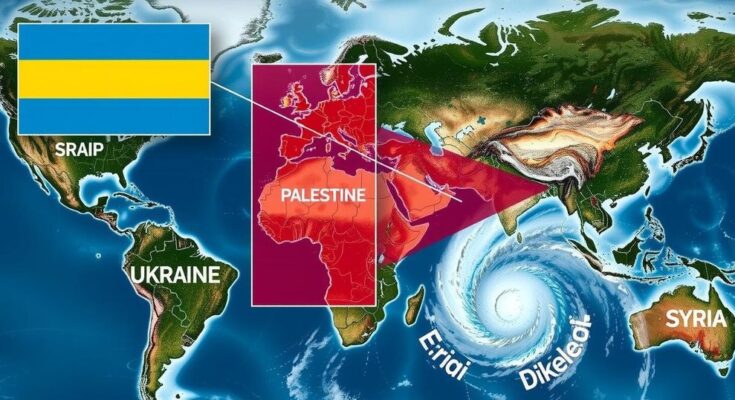This article addresses critical humanitarian situations in Ukraine, the Occupied Palestinian Territory, Syria, and the aftermath of Tropical Cyclone Dikeledi in southeast Africa. The UN is actively engaging in crisis response efforts, although significant challenges persist in delivering assistance due to conflicts and resource limitations. The dire needs of displaced populations and the impact of natural disasters underscore the necessity for immediate action and funding to support affected communities.
In Ukraine, Tom Fletcher, the UN Under-Secretary-General for Humanitarian Affairs, is engaging with affected communities and local authorities this week. He has visited various locations, including Zaporizhzhia, where he witnessed the destruction of a medical clinic and the establishment of an underground school for displaced children. Fletcher commended local responders and observed the assistance provided to evacuees in frontline regions. His schedule continues with a visit to Kharkiv, followed by the launch of humanitarian response plans for Ukraine alongside UN Refugee Agency head Filippo Grandi.
In the Occupied Palestinian Territory, the humanitarian crisis persists, exacerbated by Israeli authorities limiting UN-led aid delivery in Gaza. Out of 22 planned humanitarian movements, only seven were authorized, with numerous others denied or hindered. OCHA reports severe shortages of basic necessities among displaced Palestinians, prompting urgent appeals for civilian protection and safe passage for those fleeing violence. Recent calls for assistance highlight the dire need for humanitarian support to over 4,100 residents affected by new evacuation orders in central Gaza.
Meanwhile, in Syria, ongoing support for humanitarian efforts continues amidst a precarious security environment. The World Health Organization has completed a cholera vaccination campaign in Al Hol camp, while many regions, including Aleppo and Deir-ez-Zor, face critical challenges, such as water shortages and disruptions in telecommunications.
Finally, OCHA is closely monitoring the aftermath of Tropical Cyclone Dikeledi in southeast Africa. The cyclone has affected northern Madagascar, displacing over 350 individuals and damaging multiple health facilities. In northern Mozambique, affected populations continue to receive aid following a prior cyclone, but humanitarian partners are stressing the need for additional funding to address the overwhelming needs of those impacted by both cyclones.
This article discusses the current situations in key global crisis regions, highlighting humanitarian efforts led by UN agencies. In Ukraine, the impact of ongoing conflict on civilians is addressed, as well as the UN’s efforts to aid displaced individuals. In Gaza, the restriction of humanitarian aid delivery is a significant concern amidst escalating civilian suffering. Syria’s continuing instability poses challenges for humanitarian organizations, while Tropical Cyclone Dikeledi’s impact on Madagascar and Mozambique underscores the urgency of response efforts following natural disasters. Each section illustrates the critical role of international cooperation and timely assistance in alleviating human suffering across these regions.
The article outlines urgent humanitarian crises in Ukraine, the Occupied Palestinian Territory, Syria, and the implications of Tropical Cyclone Dikeledi in Africa. It emphasizes the challenges faced by humanitarian organizations in delivering aid due to conflicts and logistical issues, alongside the dire needs of affected populations. The ongoing crises call for an increased commitment to international humanitarian efforts and funding to effectively address these pressing global issues and provide necessary relief to those affected.
Original Source: www.unocha.org




